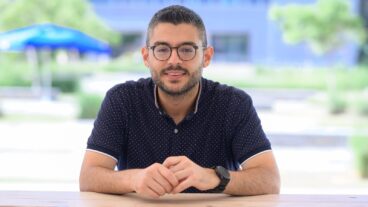Gisele Ben-Dor: The desire to conduct grew in me naturally.Internationally renowned conductor Gisele Ben-Dor may have been born in Uruguay, but her heart is in Israel.
Ben-Dor, 49, the Israeli musical director of the Santa Barbara Symphony is among the tiny group of female orchestra conductors in the world – only eight percent of all conductors – and is one of the four women in the United States who conduct symphony orchestras.
She has led, among others, the New York Philharmonic, London Symphony , London Philharmonic Orchestras, the English Chamber Orchestra, the BBC/Wales orchestra, Los Angeles Philharmonic , Boston Pops, New World Symphony, Helsinki Philharmonic, the Houston Symphony, and, of course, the Israel Philharmonic and Israel Chamber Orchestra.
As music director and conductor of the Santa Barbara Symphony, she has made her mark as a strong advocate of undiscovered musical gems and new music, and improving the artistic quality and visibility of the orchestra. Despite her busy schedule, Israel is part of her itinerary twice a year – whether or not she has professional bookings there.
“My entire family is here – my parents, bothers and sisters,” she told the Hebrew daily Yediot Aharonot during a recent visit home. “Twice a year, for work-related reasons or not, I come here. There is nothing like Israel.”
She spoke in the midst of a rehearsal for a very special concert designed to cultivate young talent in Israel – polishing young musicians by giving them the opportunity to play in orchestra under top-class conductors.
Born and raised in Montevideo, Uruguay of Polish parents, Ben-Dor took up the piano at the age of four. At 12, she fell in love with the idea of conducting, organizing her young musical friends.
“The desire to conduct grew in me naturally. I started to conduct the school orchestra,” she said. “Maybe it comes from love of teaching. It’s not for nothing that a conductor is called Maestro. Today I think I was born to it. Conducting is in my nature.”
“I had no idea it could be a profession or that I would someday be doing this as a living. I had no role models. I didn’t even know this was called conducting. It was completely instinctive. It’s like a kid playing with blocks. He or she doesn’t understand that one day they’ll be an engineer,” she told the LA Times.
A passionate Zionist at 17, Ben-Dor left Uruguay by herself for Israel, followed two months later by the rest of her family. In Israel she kept studying music and conducting, and would sneak in to watch the Philharmonic and peek at Zubin Mehta?s legendary conducting.
She went back to Uruguay to finish high school, but moved to Israel with her family in 1973. Committed to learning the conductor’s art, she studied at the Tel Aviv Academy of Music and at Yale School of Music, where she received a master’s degree in orchestra conducting in 1982.
Things fell into place with a debut with the Israel Philharmonic in 1983 and the advocacy of Leonard Bernstein, who recognized her talent and brought her to the Tanglewood Young Artists Orchestra to hone her skills, launching her international career. Her ability to move easily around the international music scene is helped by the fact that she speaks Spanish, English, French, Italian, German and Hebrew.
Neither the skepticism regarding woman conductors from traditionalists – nor the need to balance family and career has ever stood in her way. It was a memorable moment, when was nine months pregnant, Ben-Dor made her conducting debut with the Israel Philharmonic in Stravinsky’s “The Rite of Spring,” which she jokingly retitled ‘The Rite of Offspring.’
In Santa Barbara, in 2000, when she led the New Year’s Eve pops concert for the millennium, she put her young son 8-year-old Gabriel on stage, guiding the orchestra in “It’s a Small World” and “Do Re Mi.”
She enjoys her visits home to Israel where she trains and encourages young and Israeli talent, as well as the opportunity she has had to conduct the Israeli Philharmonic. “I always feel at home there. It is an amazing orchestra that is world class, not just because of the flawless musicianship, but because of the great heart with which they play. You see that they love music. There are musicians who forget why they play. They only think about work conditions and pay. They forget how lucky they are and what a gift it is to be a musician.”
She never forgets it, no matter to what lofty heights her career may climb or how much praise is lavished on her. She also never forgets her roots. In addition to classical influences growing up, she was exposed to and played Latin American folk music, the music of the Andes, of Mexico, and the Caribbean.
As a result, she has been instrumental in bringing the music of her native Latin America to the fore, and Fanfare magazine called her “one of the best things that has ever happened to the music of the southern hemisphere.”
She has been a great promotor of Silvestre Revueltas, one of Mexico’s most prestigious composers, and other Latin artists. In 1997, Ben-Dor recorded the works, and in January, orchestrated the first recording of “Amerindia” from Brazilian composer Heitor Villa-Lobos. She has also recorded the works of Argentina’s Alberto Ginastera with the London Symphony Orchestra and the Israel Chamber Orchestra.
Ben-Dor told the Associated Press that she has the satisfaction of bringing composers like Ginastera “to the fore and making an impression on people that classical music is no about old, dead white men in powdered wigs. Their time is coming.”
She says that she sees “so much richness and beauty created by these relatively unknown and unrecognized composers with the reputation of being from the so-called Third World,” she said after a recent TV interview. “How I look for composers who have created, in their musical language, the essence of their people, but through pure historical, political, economical facts, they have been ignored.”












